The Intel Core i9-9980XE CPU Review: Refresh Until it Hertz
by Ian Cutress on November 13, 2018 9:00 AM ESTHEDT Performance: Encoding Tests
With the rise of streaming, vlogs, and video content as a whole, encoding and transcoding tests are becoming ever more important. Not only are more home users and gamers needing to convert video files into something more manageable, for streaming or archival purposes, but the servers that manage the output also manage around data and log files with compression and decompression. Our encoding tasks are focused around these important scenarios, with input from the community for the best implementation of real-world testing.
All of our benchmark results can also be found in our benchmark engine, Bench.
Handbrake 1.1.0: Streaming and Archival Video Transcoding
A popular open source tool, Handbrake is the anything-to-anything video conversion software that a number of people use as a reference point. The danger is always on version numbers and optimization, for example the latest versions of the software can take advantage of AVX-512 and OpenCL to accelerate certain types of transcoding and algorithms. The version we use here is a pure CPU play, with common transcoding variations.
We have split Handbrake up into several tests, using a Logitech C920 1080p60 native webcam recording (essentially a streamer recording), and convert them into two types of streaming formats and one for archival. The output settings used are:
- 720p60 at 6000 kbps constant bit rate, fast setting, high profile
- 1080p60 at 3500 kbps constant bit rate, faster setting, main profile
- 1080p60 HEVC at 3500 kbps variable bit rate, fast setting, main profile
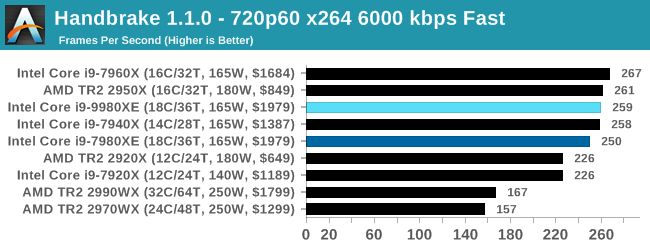
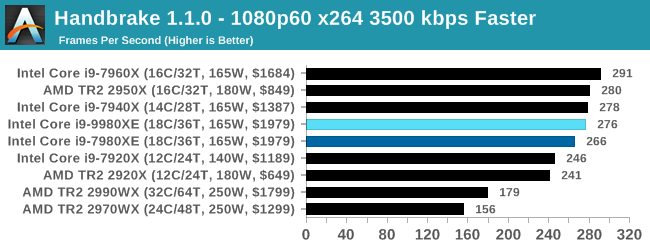
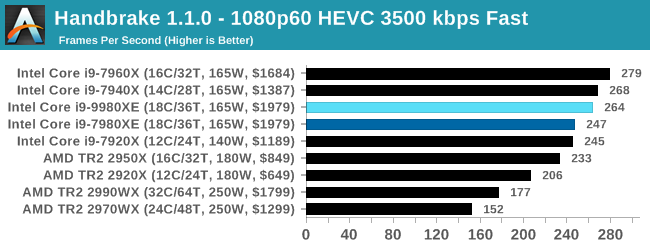
The 9980XE performs better than the 7980XE in our testing by a few percentage points, however these tests seem to benefit from fewer cores and a better turbo frequency profile.
7-zip v1805: Popular Open-Source Encoding Engine
Out of our compression/decompression tool tests, 7-zip is the most requested and comes with a built-in benchmark. For our test suite, we’ve pulled the latest version of the software and we run the benchmark from the command line, reporting the compression, decompression, and a combined score.
It is noted in this benchmark that the latest multi-die processors have very bi-modal performance between compression and decompression, performing well in one and badly in the other. There are also discussions around how the Windows Scheduler is implementing every thread. As we get more results, it will be interesting to see how this plays out.
Please note, if you plan to share out the Compression graph, please include the Decompression one. Otherwise you’re only presenting half a picture.
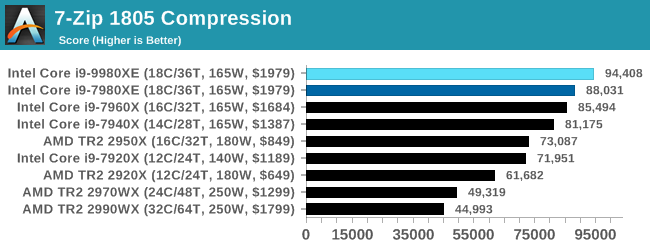
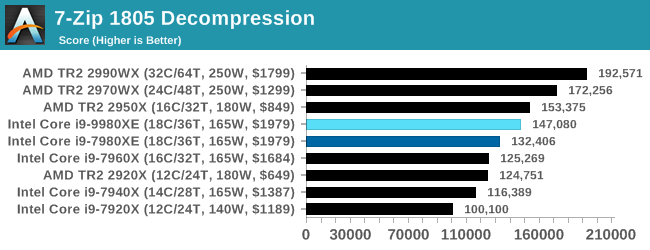
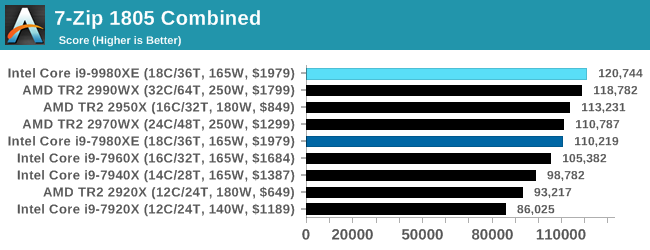
The increase in performance in both compression and decompression over the 7980XE pushes the 9980XE to the top of the overall standings.
WinRAR 5.60b3: Archiving Tool
My compression tool of choice is often WinRAR, having been one of the first tools a number of my generation used over two decades ago. The interface has not changed much, although the integration with Windows right click commands is always a plus. It has no in-built test, so we run a compression over a set directory containing over thirty 60-second video files and 2000 small web-based files at a normal compression rate.
WinRAR is variable threaded but also susceptible to caching, so in our test we run it 10 times and take the average of the last five, leaving the test purely for raw CPU compute performance.
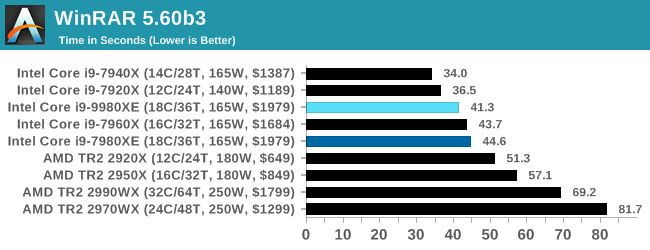
With WinRAR being a variable threaded and memory sensitive tool, while the 9980XE performs better than the 7980XE, having fewer Intel cores seems to work best.
AES Encryption: File Security
A number of platforms, particularly mobile devices, are now offering encryption by default with file systems in order to protect the contents. Windows based devices have these options as well, often applied by BitLocker or third-party software. In our AES encryption test, we used the discontinued TrueCrypt for its built-in benchmark, which tests several encryption algorithms directly in memory.
The data we take for this test is the combined AES encrypt/decrypt performance, measured in gigabytes per second. The software does use AES commands for processors that offer hardware selection, however not AVX-512.
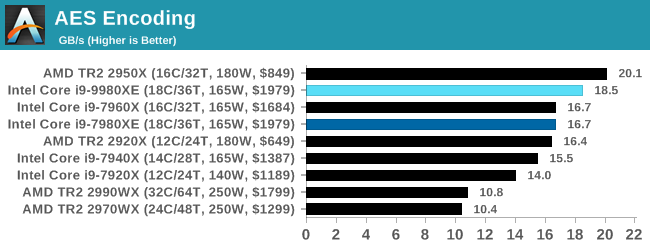
AES encoding seems to prefer AMD's situation, although the way the >16 core TR2 parts are configured is more of a hindrance. As expected, the i9-9980XE is the best Intel performer here.










143 Comments
View All Comments
Stasinek - Wednesday, November 21, 2018 - link
It's indeed suprise to me that those new 24,32C AMD processors 2920,2970 are just worst in any therms than their 16C equivalents. In terms of perf/money perf/power just laughable.Linux changes a lot but who uses Linux and for what purpose?
I bet developers but what makes me really angry is that nobody even tries to use KVM, Xen, VirtualBox, VMware, VirtualBox as benchmarking tool for purpose of testing usage as small company server. In mine company lot of Remote Desktop sessions are connected to same server.
Someone would think - who needs good CPU? But it's only because dont used to solve real life problems and those problems are like importing big databases from obsolete programs, filtering, fixing and exporting to new ERP systems. This consumes lot of time to have fast CPU is crucial. Most of companies i know uses RDP server for that purpose and typical cheep portable laptops given to workers. To have AMD or Intel HDET tested in such purposes would be nice to see. Cause anyone can potencially have 32C anyone could benefit.. but rather than this kind test i used to see gaming.. gaming od HDET?! WTF
pandemonium - Wednesday, November 14, 2018 - link
All of these "my work doesn't have any desktop users" comments crack me up. Congratulations. Your work is not the entire world of computing in a professional space, much less prosumer space. Get over yourselves.halcyon - Wednesday, November 14, 2018 - link
@Ian CutressYour tests and review text are always a pleasure to read, thank you for the professionalism.
Questions related to the test suite (I know, everybody always wants something):
1. You are missing an Excel Spreadsheet calculation (Finance still uses a lot of these and they can peg all cores near 100% and be incredibly CPU dependent). Would be nice to see some for example an Excel Monte Carlo simulation kn the suite (local data)
2. Alternatively an R (language) based test for heavy statistical computation. Finding a one that is representative of real world workloads and strikes a balance between single core IPC and many core parallelisation might take some work. But this is one area where laptops just can't muster it and CUDA/OpenCL acceleration isn't often available at all.
3. For Web / JS framework it is nice to see SpeedoMeter and WebXPRT3, but for some reason V8 Web Tooling Bench is not there (https://v8.github.io/web-tooling-benchmark/ ). The old Kraken/JetStream/Octane are nice for reference, but not very representative of real world anymore for some time now (hence why they are abandoned).
Again thank you for this monumental work, the amount of tests is already superb!
For graphing results it would be so helpful to get a comparative price/perf graphed results browser (pick your baseline CPU, pick workloads, cpus on graph as a func of price/perf). This would enable auick viewinf of the efficient frontier in terms of price/perf for each workload and see the base CPU as an anchor.
Yeah, yeah, I know.... Just throwing this in here 😀
KAlmquist - Wednesday, November 14, 2018 - link
These benchmarks also show the 16 core TR 2950X beating the 18 core i9-9980XE in some cases.KAlmquist - Wednesday, November 14, 2018 - link
My previous comment was a reply to nexuspie's observation that, "These benchmarks show that the 9980's 18 cores often BEAT the 2990wx's 32 cores."Stasinek - Wednesday, November 21, 2018 - link
Witch should lead to conlcusion AMD Threadripper 2 is just bad offer except 2950.It's the one and only AMD CPU worh mentioning - witch means TR4 16C is dead end.
AMD offers overpriced CPUs on that platform that is for sure.
Overpriced because half of cores are choking being absolute useless.
If 32C and 4 channels is too much cores/channel imagine RYEN 3 16C on dual channel..
It will be big dissapointment for some people i bet.
Regardless of pricing Intel 9980 is just great.
Stasinek - Wednesday, November 21, 2018 - link
Is that what you wanted to say?crotach - Wednesday, November 14, 2018 - link
I have to say I'm a big fan of HEDT platforms, I built my last workstation in 2011 and it still serves me well 7 years later. But looking at this and the X299 offering I really don't see why anyone would bother.Lolimaster - Thursday, November 15, 2018 - link
Till intel changes the way it builds high core count cpu's they can't compete with AMD and it will be even worse next year when AMD made an already cheaper way to produce high core count cpu's even cheaper, to sick levels.Gasaraki88 - Thursday, November 15, 2018 - link
I'm actually more interested in the i7-9800X vs. the i9-9900K. I want to see how the overclocking is compared to the i9-9900K before I just in to X299.